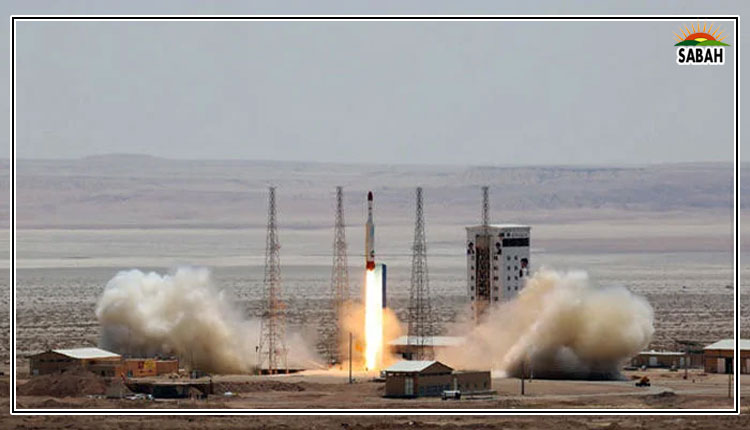Cost of sanctions…Omiamah Khan
The imposition of sanctions by the US against commercial entities allegedly having links to Pakistans ballistic missile programme stems from worries about the spread of ballistic missile technology, which may undermine regional security equilibriums and fuel the spread of armaments.
It seems Iran is taking a toll on the current US administration. Lets not forget that Iran got its first ballistic missile in the 1980s during the Iran-Iraq war. Pakistans first domestically developed ballistic missile is the Hatf-I, also known as the Babur developed by the National Development Complex (NDC) and introduced into service in 1999.
A complex and difficult policy environment seems to be highlighted by the USs recent application of sanctions on Pakistan due to worries about the proliferation of ballistic missiles in the context of Iran.
Although the US seeks to counter the spread of ballistic missile technology, the efficacy of these efforts can be questioned in light of the fact that Pakistan and Iran also have ballistic missile programmes. Furthermore, a number of other nations across the globe also have comparable capacities. So such targeted sanctions may only be a limited means of the US accomplishing some desired outcomes.
Furthermore, the imposition of sanctions risks exacerbating diplomatic relations with Pakistan, a key player in regional stability efforts, potentially driving it closer to Iran and further complicating the situation. The strategic calculus behind these sanctions reflects broader geopolitical tensions and the intricate web of relationships in the region. Despite efforts to deter proliferation, the interconnectedness of the global arms trade and technological diffusion poses significant challenges to unilateral measures. In such a case, these sanctions look quite feeble.
Pakistans pursuit of an independent foreign policy marks a significant and sensible step in the global arena. Embracing autonomy in foreign relations allows Pakistan to assert its sovereignty and pursue policies that align with its national interests while fostering peace and stability in the region. By diversifying its diplomatic engagements and maintaining constructive relationships with various countries, including Iran, Pakistan contributes to a more balanced and inclusive international order.
The USs imposition of sanctions on Pakistan, specifically with regard to the proliferation of ballistic missiles amid relations with Iran, may be interpreted as a sign of flimsy geopolitical maneuvering. Such actions run the risk of alienating important allies and needlessly raising tensions rather than encouraging communication and cooperation. Furthermore, the US may unintentionally damage its own diplomatic credibility and diminish the likelihood of fruitful engagement with Iran and other countries by attempting to apply unilateral pressure.
In contrast, a more nuanced and collaborative approach to diplomacy would serve the interests of global peace and security better. By placing a strong emphasis on communication, respect for one another, and diplomatic activity, conflicts can be resolved and common interests can be advanced.
When combined with strong diplomatic efforts, Pakistans pursuit of an autonomous foreign policy offers a chance for beneficial cooperation and global contributions. In the end, cultivating robust and inclusive diplomatic ties is advantageous to all concerned and fortifies the groundwork for a world that is both peaceful and prosperous.
Lets observe the scope and severity of the sanctions, the targeted countrys economic resilience, and the level of international cooperation in enforcing the sanctions. Here are some potential costs associated with putting sanctions:
Economic impact: Trade relations, foreign investment, and access to vital resources and markets can all be adversely affected by sanctions. This may result in a slowdown in the economy, slower GDP growth, greater inflation, and higher unemployment rates in the targeted nation as well as possibly in the nations enforcing the sanctions.
Diplomatic strain: Sanctions may cause tension in ties with other countries that may disagree with the sanctions or believe they are unwarranted, as well as between the government imposing the sanctions and the country being targeted. Increased political tensions, diplomatic isolation, and a barrier to collaboration on common international challenges can result from this.
Escalation risks: Sanctions have the ability to intensify tensions and incite retaliatory actions from the targeted nation, which might start a chain reaction of hostilities and further destabilize the area.
Opportunity costs: Applying sanctions calls for a substantial investment of time and money, as well as diplomatic efforts, enforcement tools, and compliance monitoring. These funds could be allocated to other urgent national or worldwide goals, such global health programmes, economic development, or climate change mitigation.
Sanctions are a useful instrument for expressing disapproval or applying pressure to specific entities, but they also carry a high cost which governments should carefully weigh before enacting. Additionally, in order to effectively address underlying issues and minimise negative outcomes for all parties concerned, alternate techniques to diplomatic engagement and conflict resolution should be investigated.
Courtesy The News












